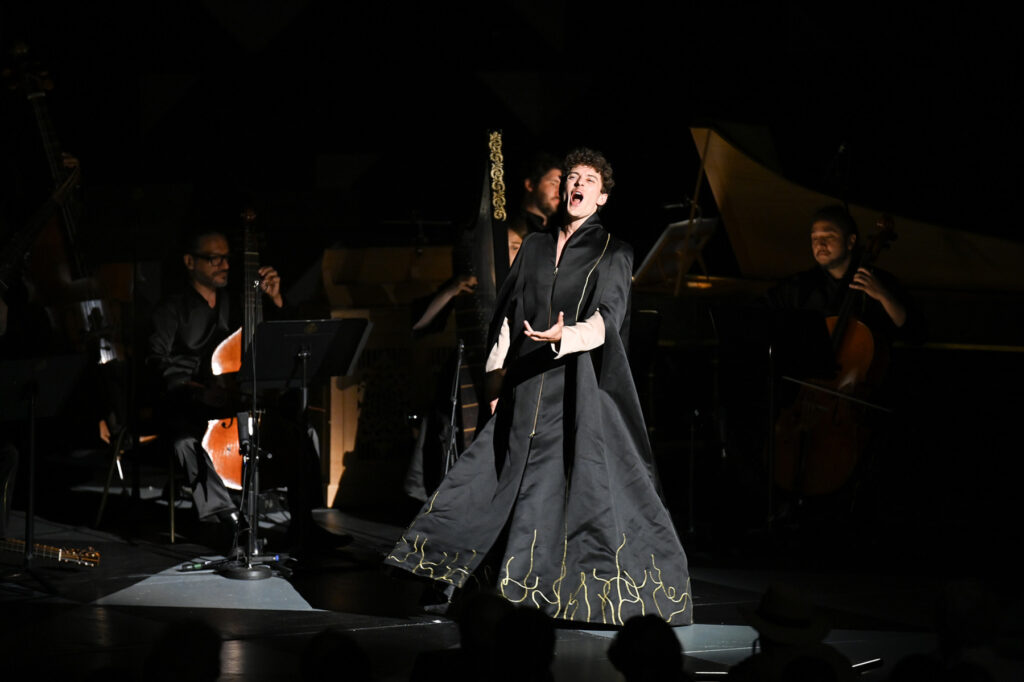For the first late night Prom of the 2024 season, Jakub Józef Orliński gave this intimate recital of 17th century Italian vocal and operatic music, which would have been sung in the convivial surroundings of the saloons or drawing rooms of the well-to-do, or in the public spaces of the opera houses of that period, though still significantly smaller than the Albert Hall. Nevertheless, the acoustic of the latter has a way of drawing an audience in, and so it was here. Ostensibly this theatrical presentation with the countertenor and his backing ensemble Il Pomo d’Oro, dramatically spotlit in an otherwise darkened hall, aimed to engage us visually too.
Undoubtedly atmospheric as that was, the inability to follow the music’s words in the programme and lack of surtitles diminished the impact of the concert, as it was only possible to follow its meanings in a general way. Given the spectacle, this Prom would have been suitable for television broadcast, where subtitles could be available, but this wasn’t broadcast or recorded for that means – with four mainstream channels there’s no reason the BBC can’t televise more than the measly dozen or so on offer this season (the usual paltry fraction it televises in any season). Orliński’s gestures on stage were more distracting than illuminating – for instance, in swirling around in a big black cape and shedding it at various points. Only his wearing its hood and delivering the two extracts from Netti’s L’Adamiro with a deliberately weedy tone indicated that these numbers were intended as the conceit (typical of Venetian opera) of an elderly nurse played in drag by a male singer (although this opera was, in fact, premiered in Naples). But overall, the choreographic scenario felt more like a self-indulgence than giving us any lead into the musical settings themselves.

Purely on its intrinsic musical terms the performance was certainly captivating. Orliński communicated with his distinctive timbre – almost unworldly with its virtual lack of vibrato, but coloured with enough of a human yearning and passion with an Italianate nasal tinge to make the music carry successfully in the Albert Hall’s huge space. The vocal numbers generally expressed forlorn or unrequited love, and so were threaded together here as a seamless whole (more or less without a break, and mercifully without applause after each piece). The two Monteverdi items were impressively conceived as a sustained whole, accumulating tension before finding release in an animated volley of melismas, after which the mood was calmed again with the sorrowful Passacaglia by Marini. The instrumental interpolations offered more variety and were played by Il Pomo d’Oro with much alacrity and nuance. What seemed to be an extended improvisation by Miguel Rincón on the guitar as a prelude to the aria from Sartorio’s Antonino e Pompeiano jarred somewhat with its jazzy harmonic twists and little relation to the surrounding music.
Amidst so much little-known repertoire, there were undeniably some rewarding discoveries (unsurprisingly, only the extracts from L’incoronazione di Poppea and Caccini’s Le nuove musiche have been heard at the Proms before). But I’m uncertain that those not already convinced of the value of early Baroque music would have gained much insight into it; the staging was dispensable.
Curtis Rogers
Jakub Józef Orliński (countertenor), Il Pomo d’Oro
Claudio Monteverdi: L’incoronazione di Poppea – ‘E pur io torno qui’
Claudio Monteverdi: ‘Voglio di vita uscir’
Biagio Marini: Per ogni sorte di strumento musicale, Op. 22 – Passacaglia
Giulio Caccini: Le nuove musiche – ‘Amarilli, mia bella’
Girolamo Frescobaldi: Arie musicali, Book I – ‘Cosi mi disprezzate’
Johann Kaspar Kerll: Sonata for two violins in F
Barbara Strozzi: Cantate, ariette e duetti, Op. 2 – ‘L’amante consolato’
Francesco Cavalli: Pompeo Magno – ‘Incomprensibil nume’
Carlo Pallavicino: Demetrio – Sinfonia
Giovanni Cesare Netti: La Filli – ‘Misero core’; ‘Sì, sì, sì scoglia sì’; ‘Dolcissime catene’
Antonio Sartorio: Antonino e Pompeiano – ‘La certezza di tua fede’
Giovanni Cesare Netti: L’Adamiro – ‘Quanto più la donna invecchia’; ‘Son vecchia, patienza’
Adam Jarzebski: Canzoni e concerti – Tamburetta
Sebastiano Moratelli: La Faretra smarrita – ‘Lungi dai nostri cor’
Royal Albert Hall, London, 23 July 2024.
All photos by Chris Christodolou.